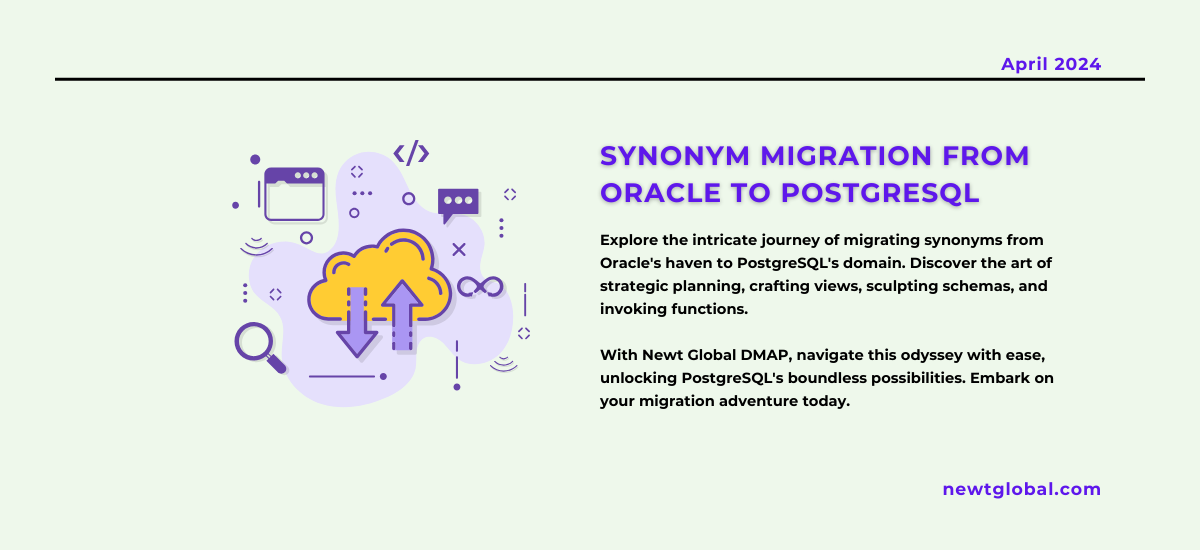
Moving your database from Oracle to PostgreSQL can be exciting! This guide will help you with a specific challenge: migrating synonyms, which are shortcuts to database objects in Oracle. PostgreSQL doesn’t use synonyms directly, but there are other ways to achieve the same results.
Synonyms in Oracle and PostgreSQL
Synonyms in Oracle are like secret names for database objects, making it easier to work with them without worrying about complex naming structures. In PostgreSQL, things are different as it doesn’t directly support synonyms. Instead, it uses a combination of views, schemas, and functions to achieve similar results.
Oracle: The Place for Synonyms
Oracle’s synonyms act as aliases for database objects, simplifying the way users interact with them without revealing their true names.
PostgreSQL: A Different Approach
PostgreSQL approaches synonyms differently by using views, schemas, and functions instead of direct synonym support.
Step-by-Step Guide
Here’s a breakdown of the migration process:
Step 1: Understand Your Oracle Synonyms
First, learn about all the synonyms you use in Oracle. This will show you what you’ll need to recreate in PostgreSQL
Step 2: Plan Your PostgreSQL Strategy
Decide how you’ll replace synonyms in PostgreSQL. Will you use views, change the database structure, or create new functions? Each approach has its pros and cons.
Step 3: Implement Your Plan
Use views to mimic synonyms, modify schemas for more complex setups, or create functions for special tasks. Test everything carefully to make sure it works.
Step 4: Test Your Setup
Try out your new setup in a safe environment to make sure it’s reliable before switching everything over.
Step 5: Deploy and Monitor
When you’re ready, move everything to PostgreSQL. Keep an eye on things to make sure they run smoothly and make adjustments as needed.
Tips for Success:
-
- Document Your Oracle Setup: Make sure you understand how your synonyms work in Oracle before you start.
- Think About Performance:Consider how your new PostgreSQL setup will perform under different loads and optimize for speed.
- Involve Your Team:Work closely with your team to make sure everyone is on the same page and ready for the switch.
- Test Thoroughly: Don’t skip testing – it’s crucial to catch any issues before they cause problems in production.
Conclusion
Migrating synonyms from Oracle to PostgreSQL requires planning and adaptation. While PostgreSQL’s approach may be different, it offers flexibility and room for innovation. Use this guide to navigate the migration process effectively and embrace the new possibilities PostgreSQL brings.
Are you ready to embark on the journey of migrating synonyms from the sanctuary of Oracle to the majestic realm of PostgreSQL?
Our comprehensive guide, “Mastering the Art of Synonym Migration: From Oracle’s Realm to PostgreSQL’s Territory,” serves as your beacon through this thrilling adventure.
Navigating this transition demands strategic foresight and meticulous planning. With Newt Global DMAP, a world-class product enabling mass migration of Oracle Db to cloud-native PostgreSQL faster, better, and cheaper, your journey is set to be smooth sailing.
For expert guidance and seamless migration assistance, visit our website at newtglobal.com or reach out to us via email at marketing@newtglobalcorp.com.
Embrace the journey, and let Newt Global DMAP pave the way to your database migration success.
